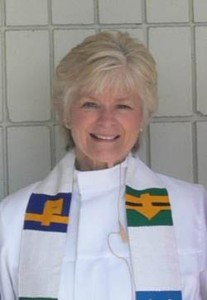 Rev. Elizabeth (Liz) Jensen is an ordained Covenant Pastor serving as the solo pastor of the Evangelical Covenant Church of Venice Isle in Venice, FL. She serves as the treasurer of Advocates for Covenant Clergy Women (ACCW). She recently completed 6 years serving on the Committee on Ministerial Standing (COMS) of the Southeast Conference (SEC) Ministerium; she chaired the committee the last three years. At their 2016 annual meeting she was elected President of the SEC Ministerium. She also serves as treasurer and chaplain for the Military Officers Association of America (MOAA) Venice Area Chapter; her husband is a retired Lieutenant Colonel from the Minnesota Army National Guard.
Rev. Elizabeth (Liz) Jensen is an ordained Covenant Pastor serving as the solo pastor of the Evangelical Covenant Church of Venice Isle in Venice, FL. She serves as the treasurer of Advocates for Covenant Clergy Women (ACCW). She recently completed 6 years serving on the Committee on Ministerial Standing (COMS) of the Southeast Conference (SEC) Ministerium; she chaired the committee the last three years. At their 2016 annual meeting she was elected President of the SEC Ministerium. She also serves as treasurer and chaplain for the Military Officers Association of America (MOAA) Venice Area Chapter; her husband is a retired Lieutenant Colonel from the Minnesota Army National Guard.
Have you heard the song “Words”? The lyrics roughly declare that words can make people feel like prisoners or can set them free. Words can make people feel like criminals or kings. Words can lift hearts to new places and drag hearts back into a pit. Words can build up and break down. Words can start a fire in a heart or put it out.
How do our words impact those who hear them? For those in ministry, how do the words of your preaching, teaching, singing and writing impact those who hear or sing or read them? We would never use derogatory language in reference to any group, yet I hear and read and sing words that ignore, diminish, overlook, and disregard half the population. Can you see it in these Scripture quotations?
“Blessed is the man who does not walk in the counsel of the wicked” (Psalm 1:1).
“Follow Me, and I will make you fishers of men” (Matthew 4:19).
“If I speak in the tongues of men or of angels,” (1 Corinthians 13:1).
“The prayer of a righteous man is powerful and effective” (James 5:16).
If you do not see a problem with these words, read on. You see, words matter! Can you see (or hear) it in these lyrics from “Be Thou My Vision”? Verse 2:
“Thou my great Father, I Thy true son; Thou in me dwelling, and I with Thee one.” Verse 3: Riches I heed not, nor man’s empty praise,”
Can you see (or hear) it in these lyrics from “Joy to the World”?
“Joy to the world! the Savior reigns. Let men their songs employ.”
Can you hear it in these sermon declarations?
“Man has fallen. Jesus came to redeem man.”
Can you hear it in these illustrations?
“The pastor…he. The Sunday school teacher…she. The fireman…he. The policeman…he. The secretary…she.”
These are but a few examples of what I have seen and heard – some rather recently. What message do these words send? As a woman, when scripture quotes ignore me, when sermons disregard me, when illustrations diminish me, and when songs overlook me I am lost to their message. I should not have to “suck it up” to hear God’s word and sing praises to Jesus. It is time to tune up our awareness of how the words we use in preaching, teaching, singing and writing impact half the people to whom we speak and to whom and with whom we minister. Words matter. Let’s not just tune up our awareness, let’s change our words so all are included.
“Blessed are those who do not walk in the counsel of the wicked” (Psalm 1:1).
“Follow Me, and I will make you fishers of people” (Matthew 4:19).
“If I speak in the tongues of humans or of angels” (1 Corinthians 13:1).
“The prayers of the righteous are powerful and effective” (James 5:16).
“Be Thou My Vision” in the Covenant Hymnal a Book of Worship uses totally inclusive language. Here it is in case you don’t have the book:
Verse 2:
“Thou my great Father, thy child shall I be; Thou in me dwelling, and I one with thee.
“Riches I heed not, nor vain, empty praise.”
“Joy to the World” is easily changed to “Let us, our songs employ.”
We can change our sermons to declare: “All humanity has fallen. Jesus came to redeem us all.”
We can change our language to remove gender specific pronouns. Or we can regularly refer to “The pastor…she. The Sunday school teacher…he. The firefighter. The police officer. And even the secretary…he.” Be bold. Be brave. My brothers and sisters in Christ, do as did Jesus. He reached out to women in ways that were counter to his culture. It suggests to me that Jesus would not want females ignored in our preaching, teaching, singing and writing today. Words matter!
Let me ask a few questions using the song “Words”. Do your words make women feel like prisoners or help set them free? Do your words make women feel like criminals or help them feel like royalty? Do your words lift women’s hearts to new places or drag them into a pit? Do your words build up women or break them down? Do your words start a fire in women’s hearts or put fires out? Words matter!


Discovering What You Didn’t Know Was Missing
Filed under: Book & Commentary, Testimonies and Stories
Nilwona Nowlin currently serves as the Administrative Specialist for Governance for the ECC and is a member of the Christian Community Development Association and the Redbud Writers Guild. In her “spare time,” she teaches workshops about living successfully as an introvert. Nilwona is a member of the Kingdom Covenant Church (Chicago) launch team and randomly blogs about random things at thedreamerspeaks.
I’ve been reading leadership books for years, but it was only recently that I realized something: none of the books I’d been reading were written by women. If I broadened my definition of a “leadership book,” it might allow for the inclusion of a small handful of female authors. (And I haven’t even bothered to raise the issue of ethnicity.) I am naturally quite observant, but sometimes – like in this case – it takes me a while to notice a pattern. In other cases, I miss the pattern altogether.
Last week, I participated in the ECC Sankofa Journey, and experienced quite an eye-opening surprise: both of our drivers were black women. It wasn’t until I saw them that I realized I had never seen a female coach bus driver, let alone one who was a black female. (To add to our amazement, they were also sisters.) In all my experiences riding on a coach bus, I had never stopped to wonder whether or not there were women in this business. In my moment of giddy elation, I said to a friend, “You don’t even realize what’s not there until you see it!” As I reflected on this moment, it helped me understand why I was so excited about a book I recently read.
There are lots of articles, books and memes on leadership that suggest that individuals should regularly be in relationships as both a mentor and a mentee. Because I sometimes fall into the trap of believing that the source of my paycheck defines who I am, I often struggle with whether or not I have anything of value to share with a mentee. We often see mentoring as a “secular” thing, but Robinson describes it as an opportunity to “partner with God.” This reframing of mentoring as discipleship helps me rethink things. While mentoring seems like a good thing to do, discipleship is a non-negotiable for Christians. In addition, Robinson focuses on mentoring in a communal setting vs. the typical 1-on-1 style. (I do think that the group model has become more popular in recent years.)
Since I’ve only recently experienced Robinson’s book, I don’t have any testimonials about how this method has worked for me. However, I’m excited about the opportunity to put into practice what I’ve learned. I’m particularly excited about the fact that I don’t have to do a lot of contextualizing/translating, because Robinson has taken into consideration how issues of diversity (age, gender, ethnicity, culture, etc.) impact discipleship/mentoring efforts. If you’d like to know more about Robinson or Mentoring for Life, check out her website.
Report This Post